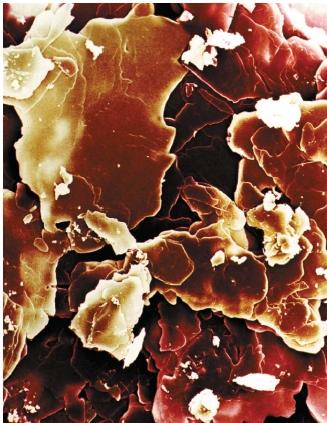Cholesterol
Cholesterol is a waxy substance found in the blood and body tissues of animals. It is an important structural component of animal cell membranes. Cholesterol is a lipid, a group of fats or fatlike compounds that do not dissolve in water. More specifically, it is a type of lipid known as a steroid. Other steroids include hormones, which are chemical substances produced by the body that regulate certain activities of cells or organs.
Cholesterol in the human body
Cholesterol is a biologically important compound in the human body. It is produced by the liver and used in the manufacture of vitamin D, adrenal gland hormones, and sex hormones. Large concentrations of cholesterol are found in the brain, spinal cord, and liver. Gallstones that occur in the gall bladder are largely made up of cholesterol. It is also found in bile (a fluid secreted by the liver), from which it gets its name: chol (Greek for "bile") plus stereos (Greek for "solid").
Normally, cholesterol produced by the liver circulates in the blood and is taken up by the body's cells for their needs. Cholesterol can also be removed from the blood by the liver and secreted in bile into the small intestine. From the intestine, cholesterol is released back into the bloodstream.
The body does not need cholesterol from dietary sources because the liver makes cholesterol from other nutrients. Eating saturated fats can cause the liver to produce more cholesterol than the body needs. Therefore, a diet high in saturated fats and cholesterol can raise blood cholesterol levels. Excess cholesterol that is not taken up by body cells may be deposited in the walls of arteries.
Cholesterol and heart disease. There has been much debate in the scientific community concerning the relationship between eating foods high in cholesterol and developing atherosclerosis (the blockage of coronary arteries with deposits of fatty material). Atherosclerosis impairs the flow of blood through arteries and leads to heart disease. A high blood cholesterol level is a risk factor for coronary artery disease.
Studies have shown that the major dietary cause of increased blood cholesterol levels is eating foods high in saturated fats (found mostly in animal products)—not foods containing cholesterol, as was once believed. Smoking, lack of exercise, obesity, caffeine, and heredity are other factors influencing blood cholesterol levels.
Words to Know
Atherosclerosis: A disease in which plaques composed of cholesterol and fatty material form on the walls of arteries.
Bile: A fluid secreted by the liver that aids in the digestion of fats and oils in the body.
High-density lipoprotein (HDL): A lipoprotein low in cholesterol that is thought to protect against atherosclerosis.
Lipoprotein: A large molecule composed of a lipid (a fat or fatlike compound), such as cholesterol, and a protein.
Low-density lipoprotein (LDL): A lipoprotein high in cholesterol that is associated with increased risk of atherosclerosis.
Proteins: Large molecules that are essential to the structure and functioning of all living cells.
Saturated fat: Fats that are solid at room temperature or that become hard when exposed to cold temperatures.
"Good" cholesterol and "bad" cholesterol
Cholesterol is carried in the blood bound to protein molecules called lipoproteins. Most of the cholesterol is transported on low-density lipoproteins (LDLs). LDL receptors on body cell membranes help regulate the blood cholesterol level by binding with LDLs, which are then taken up by the cells. However, if there are more LDLs than LDL receptors, the excess LDLs, or "bad" cholesterol, can be deposited in the lining of the arteries. High-density lipoproteins (HDLs), or "good" cholesterol, are thought to help protect against damage to the artery walls by carrying excess LDL back to the liver.
[ See also Circulatory system ; Heart ; Lipid ; Nervous system ]

I was told by my proffessor we don't need dietary cholesterol in our diet because our body can produce its own. Tryglycerides is a chemical in our body mainly composed of fatty acids. VLDL is a Lipoprotein but has a very low density. I'll give this analogy. Saturated fat like butter floats on top of water. It floats because its density is low. Your body is mostly water. Water meaning the chemical H2O. The composition of our blood fluid is mostly water. Fat and water doesn't mix. So to answer your question. Read your food lables and know what you are eating. Consume less Saturated fats. Consume less dietary cholesterol. Walk at least once a day for a hour and try to get in more of your kcalories from grains, fruits, vegetables and get less of it from animal products. You don't have to do this your whole life, maybe when you are 60 or 70 you can change it.